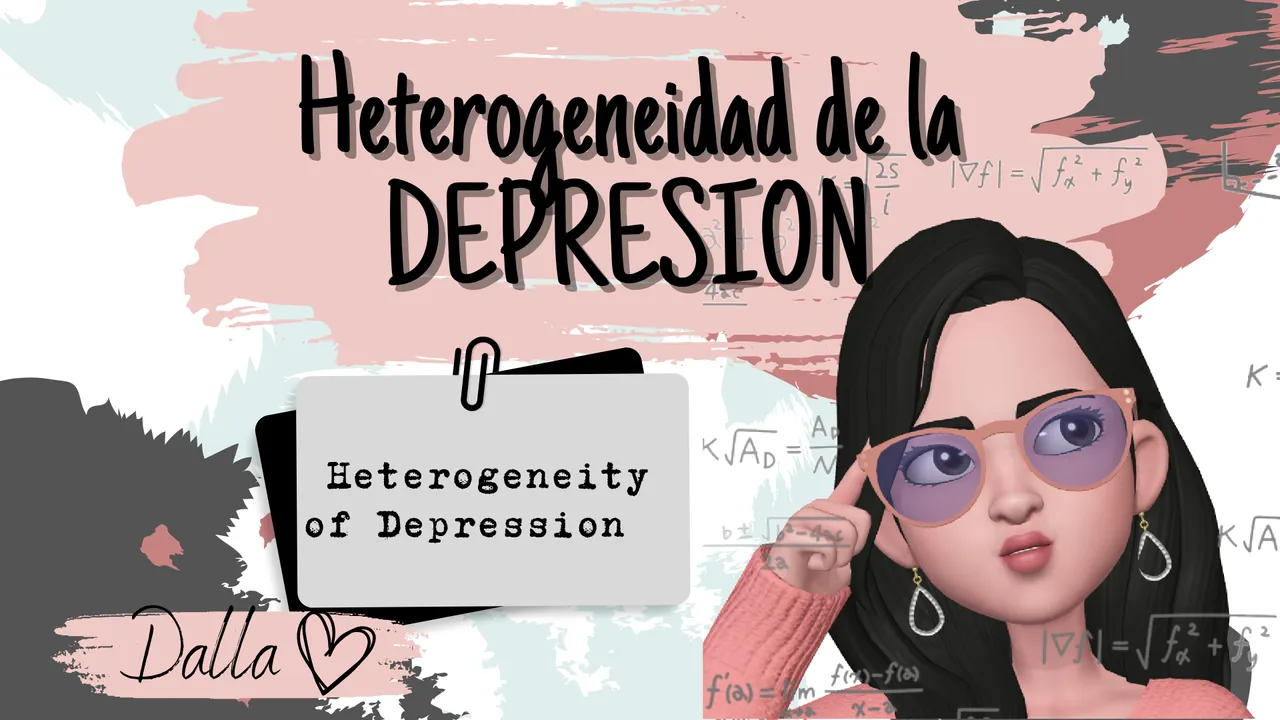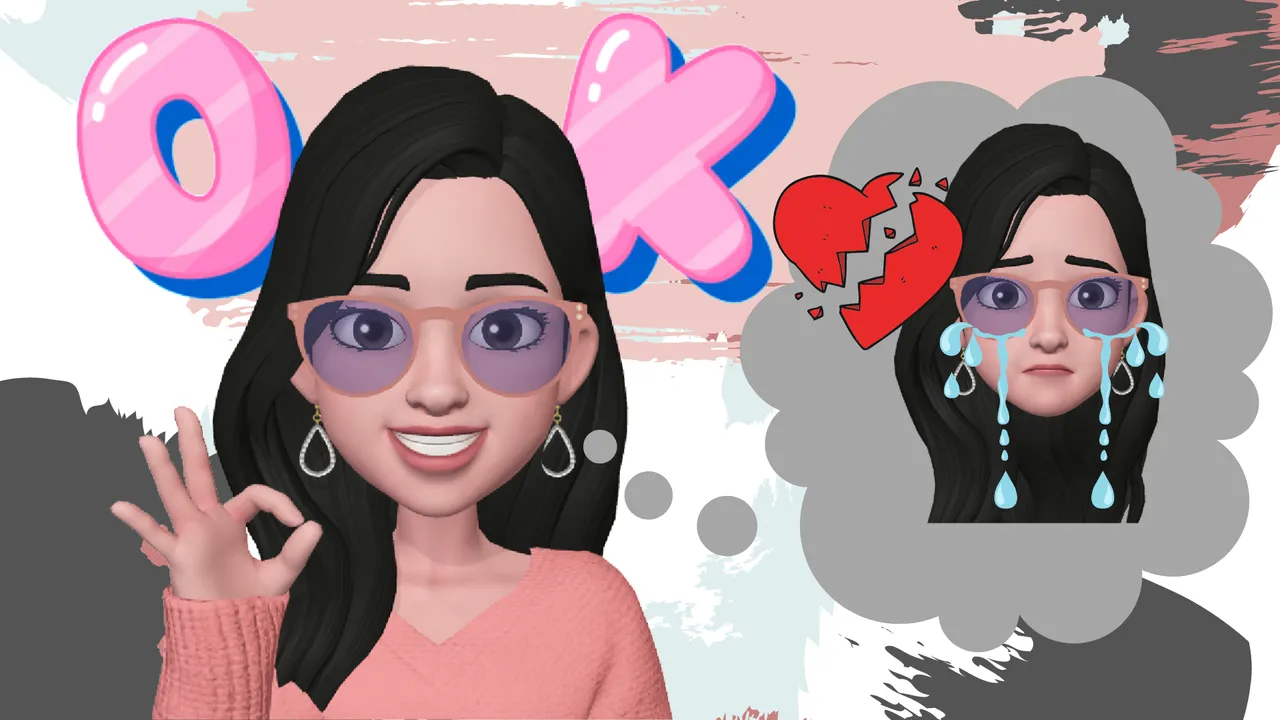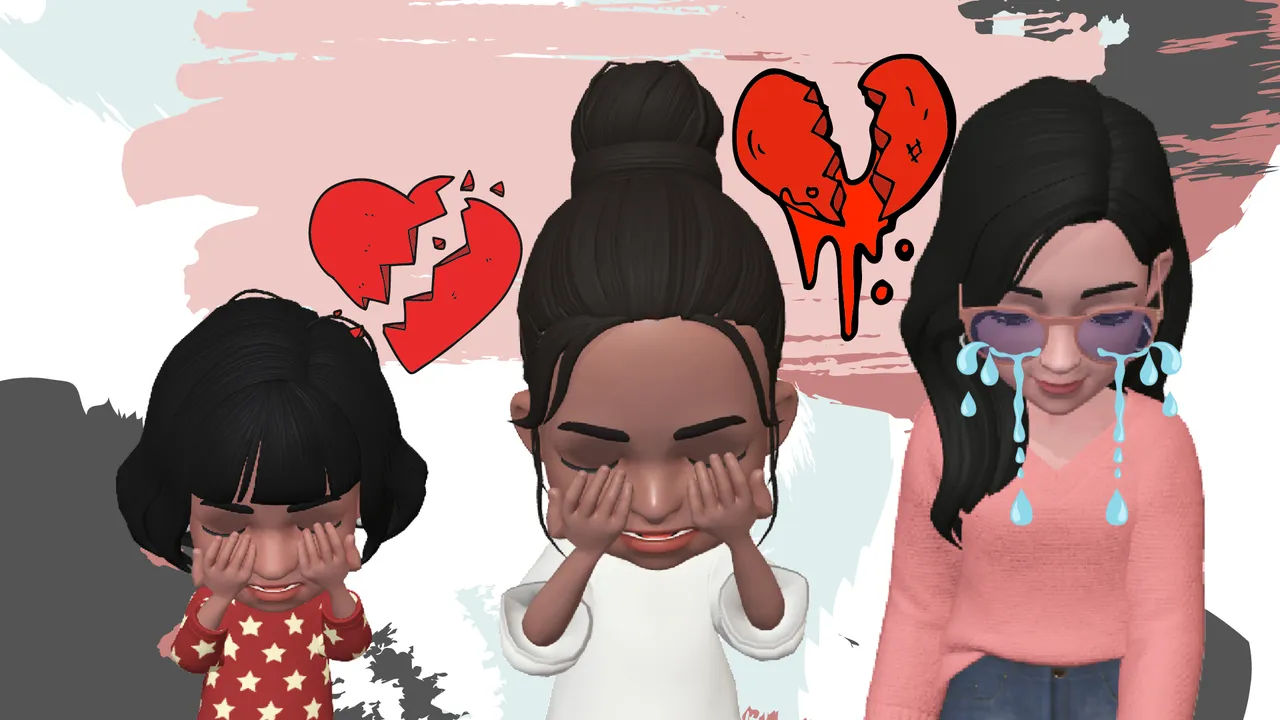

¡Feliz fin de semana chicos! el día de hoy en mis post Psicoeducativos, vengo a hablarles un poco de la diversidad que existe en la Depresión.
Happy weekend guys! Today in my Psychoeducational posts, I come to talk to you a little bit about the diversity that exists in **Depression.

A este punto de la historia parece difícil imaginar que aun existan personas que piensen que la Depresión no existe, pero la verdad es que si revisas tu alrededor y las redes sociales, te darás cuenta de que en realidad existe un grupo bastante grande de personas que se niegan a aceptar que estamos ante una enfermedad contra la cual es muy difícil de luchar y que justamente una de las razones principales por las cuales esto ocurre, es por ese grupo de personas que niegan su existencia.
Y es que lo que diferencia las Enfermedades Mentales, de las enfermedades comunes que tenemos en medicina, es que éstas no se presentan de igual forma en todos, de hecho, tenemos algunos criterios diagnósticos para ayudarnos a delimitar este grupo de personas, pero en realidad es algo que depende bastante de la subjetividad de cada individuo, es decir, como se sienten y se perciben así mismos.
Y es aquí donde entra la complejidad a la hora de establecer un grupo específico de personas que sufren de la enfermedad y es porque la subjetividad es difícilmente algo homogéneo y perceptible a simple vista, porque cada persona, aun teniendo la enfermedad, se puede percibir así mismo como "normal", aun cuando no entre en este parámetro.
La cuestión es que las Enfermedades Emocionales no surgen de la nada, comúnmente son un conjunto de factores que desembocan en ellas y normalmente son largos periodos luchando con los diversos desencadenantes, tiempo durante el cual una persona puede haberse acostumbrado a sí mismo a entender su "Normalidad" y percibirse como “diferente” sin realmente darse cuenta de que algo de sí necesita ser cambiado.
Muchos desconocen la existencia de estas enfermedades e, incluso, se han acostumbrado a ver ciertos comportamientos en largas generaciones familiares, crecieron viendo estos patrones de conducta y considerándolos como "normales", por lo que puede que nunca expresen lo que realmente sienten y por ende nunca busquen ayuda.
At this point in history it seems difficult to imagine that there are still people who think that Depression does not exist, but the truth is that if you check your surroundings and social networks, you will realize that there is actually a fairly large group of people who refuse to accept that we are facing a disease against which it is very difficult to fight and that precisely one of the main reasons why this happens, is because of that group of people who deny its existence.
And what differentiates the Mental Illnesses, from the common diseases that we have in medicine, is that these do not present themselves in the same way in everyone, in fact, we have some diagnostic criteria to help us to delimit this group of people, but in reality it is something that depends on the subjectivity of each individual, that is to say, how they feel and perceive themselves.
And it is here where the complexity comes in when establishing a specific group of people suffering from the disease and it is because subjectivity is hardly something homogeneous and perceptible to the naked eye, because each person, even having the disease, can perceive himself as "normal", even if he does not fall within this parameter.
The point is that Emotional Illnesses do not come out of nowhere, they are commonly a set of factors that lead to them and are usually long periods of time struggling with the various triggers, during which time a person may have accustomed themselves to understanding their "Normality" and perceiving themselves as "different" without really realizing that something about themselves needs to be changed.
Many are unaware of the existence of these illnesses and have even grown accustomed to seeing certain behaviors in long generations of family members, grew up seeing these patterns of behavior and considering them as "normal", so they may never express what they really feel and therefore never seek help.



La edad, por ejemplo, es un factor muy importante a considerar cuando hablamos de Depresión y es que esta no se presenta por igual en las diferentes etapas de la vida, un niño puede estar deprimido y los padres solo verlos como un niño rebelde o que no le gusta hacer sus tareas y nunca si quiera pensar en esta posibilidad.
Muchos adultos mayores no van a expresar sentimientos de tristeza, inutilidad o sus pensamientos intrusivos, muchos solo no quieren darle más carga a sus hijos y caen en deterioros cognitivos, muchos de los cuales terminan siendo encasillados en cuadros de "Demencia" y nunca se les da la ayuda pertinente, porque muchos familiares lo consideraron normal por su edad.
En la juventud y en la adultez temprana hay también una heterogeneidad bastante evidente y es por las distintas personalidades, los patrones de crianza aprendidos, los ambientes en que se desenvuelven, las actividades que se acostumbran a realizar comúnmente, de quienes se rodean, etc, la realidad es que pueden haber muchas personas a nuestro al rededor pasando por situaciones difíciles en su vida y, tal vez, nunca nos enteremos hasta que sea demasiado tarde.
Por eso no hay un estándar, por eso el diagnostico se hace en una valoración con un médico o un psicólogo, alguna persona especializada en detectar, no solo a través de preguntas, el estado emocional de una persona, son muchas las estrategias que se pueden emplear y es por eso que instamos siempre a acudir a la consulta y a no autodiagnosticarse a través de ningún medio que no sea el especializado y enfocado en una persona.
Por supuesto también existen las personas que lucen a leguas que están deprimidas, éstas tienen muchos signos evidentes clínicamente, no tienen la fortaleza para levantarse del hoyo en el que se encuentran, tal vez están pasando por un episodio agudo por primera vez en su vida y los síntomas son muy claros, al menos para algunos.
Age, for example, is a very important factor to consider when talking about Depression because it does not occur equally in the different stages of life, a child can be depressed and the parents just see them as a rebellious child or do not like to do their homework and never even think about this possibility.
Many older adults will not express feelings of sadness, worthlessness or their intrusive thoughts, many just do not want to give more burden to their children and fall into cognitive impairment, many of which end up being pigeonholed as "Dementia" and are never given the relevant help, because many family members considered it normal for their age.
In youth and early adulthood there is also a quite evident heterogeneity and it is because of the different personalities, the learned patterns of upbringing, the environments in which they develop, the activities they are used to perform commonly, who they surround themselves with, etc., the reality is that there may be many people around us going through difficult situations in their lives and, perhaps, we will never find out until it is too late.
That is why there is no standard, that is why the diagnosis is made in an assessment with a doctor or a psychologist, a person specialized in detecting, not only through questions, the emotional state of a person, there are many strategies that can be used and that is why we always urge to go to the consultation and not to self-diagnose through any means that is not specialized and focused on a person.
Of course, there are also people who look like they are depressed, they have many clinically evident signs, they do not have the strength to get up from the hole they are in, maybe they are going through an acute episode for the first time in their life and the symptoms are very clear, at least for some.



También existen las que llevan muchos años luchando con la enfermedad, estas son las que son más difíciles de diagnosticar porque su personalidad se puede haber amoldado a el estado emocional, pueden haber desarrollado muchos mecanismos de defensa que los ayuden a soportar y se ocultan de los demás, no quieren que los vean con lástima, que los vean diferente, verse débiles, así que actúan igual que la mayoría para lucir como todos.
La Depresión es un proceso complejo de lucha, que se puede reagudizar por momentos, pueden haber desencadenantes esporádicos, pero antes de eso, vamos a tener personas que pueden aparentar no tener ningún problema, como también esa misma persona en determinados momentos podemos verla claramente luchando contra esta terrible enfermedad, es variable, son episodios que pueden minimizarse en el tiempo, pero persistir ahí, en el inconsciente.
La realidad y que quiero que se lleven con este post queridos lectores, es que no sabemos quién puede estar pasando por una situación de esta índole, incluso puede que la misma persona no lo note porque desconozca de estas enfermedades, pero los pensamientos intrusivos pueden estar presentes, las ideaciones también.
Es por todo esto que les digo que los invito a todos a recordar que ninguno de nosotros somos capaces de leer la mente de otros, por ello, no sabemos por lo que puede estar pasando emocionalmente, así que, intentemos ser amables siempre, porque una palabra de nosotros puede ser la salvación o el hundimiento más profundo de esa persona que está luchando.
¡Espero que mi psicoeducación de esta semana les haya servido a algunos y si llegaste hasta aquí, Gracias por pasar y leerme!
There are also those who have been struggling with the disease for many years, these are the ones that are more difficult to diagnose because their personality may have molded to the emotional state, they may have developed many defense mechanisms to help them endure and hide from others, they do not want to be seen with pity, to be seen differently, to look weak, so they act the same as most to look like everyone else.
The Depression is a complex process of struggle, which can be exacerbated at times, there may be sporadic triggers, but before that, we will have people who may appear to have no problem, as well as that same person at certain times we can see clearly struggling against this terrible disease, it is variable, are episodes that can be minimized over time, but persist there, in the unconscious.
The reality that I want you to take away with this post dear readers, is that we do not know who may be going through a situation of this nature, even the person himself may not notice it because he is unaware of these diseases, but intrusive thoughts may be present, ideations as well.
It is for all this that I tell you that I invite you all to remember that none of us are able to read the mind of others, therefore, we do not know what they may be going through emotionally, so, let's try to be kind always, because a word from us can be the salvation or the deepest sinking of that person who is struggling.
I hope my psychoeducation this week has been helpful to some of you and if you made it this far, Thanks for stopping by and reading me!



DeepL
|Twitter X|
